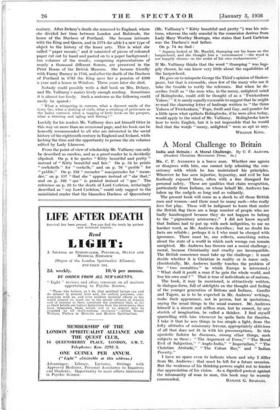A Moral Challenge to Britain
Ma. C. F. AispnEws is a brave man. Whether one agrees or disagrees with him, one cannot help admiring the con- sistency with which he has maintained his principles. Wherever he has seen injustice, hypocrisy, and evil he has fearlessly exposed them, often with a fine disregard for personal safety. These are qualities that claim recognition, particularly from Indians, on whose behalf Mr. Andrews has taken up the cudgels so long and so valiantly.
The present book will come as a shock to all those British men and women—and there must be many such—who really love fair play. These will be indignant to learn that under the British flag there are a large number of people who are badly handicapped because they do not happen to belong to the "pigmentary aristocracy." I did not know myself that Indians had to put up with such indignities, to use no harsher word, as Mr. Andrews describes ; but no doubt his facts are reliable ; perhaps it is I who must be charged with ignorance. There must be, one reflects, something rotten about the state of a world in which such wrongs can remain unrighted. Mr. Andrews has thrown out a moral challenge ; moral, because Christianity and cruelty are incompatible. The British conscience must take up the challenge : it must decide whether it is Christian in reality or in name only. (Incidentally, Mr. Andrews hardly touches the problem of the "two moralities" in which Europe is interested.) "What shall it profit a man if he gain the whole world, and lose his own soul ? " That is true of individuals as of nations.
The book, it may be mentioned, is attractively written, in dialogue-form, full of sidelights on the thought and feeling of the younger generation of Britons and Indians. Gandhi and Tagore, as is to be expected in Mr. Andrews' writings, make their appearance, not in person, but in quotations, saying the usual things in the usual manner. Mr. Andrews himself is a sincere and selfless man, but he cannot, by any stretch of imagination, be called a thinker. I find myself quarrelling with him whenever he quits facts for theories.
I take it that he sees things in too simple a light, from the _ lofty altitudes of missionary fervour, appropriately oblivious of all that does not fit in with his preconceptions. In this
apostolic fashion he discusses, among other things, such subjects as these : " The Argument of Force," "The Moral Evil of Subjection," " Anglo-India," "Imperialism," "The Christian Attitude," "The Colour Bar," and "Indian Poverty."
I have no space even to indicate where and why I differ from Mr. Andrews : that must be left for a future occasion.
But the weakness of his thinking-powers ought not to hinder due appreciation of his vision. As a dignified protest against the inhumanity of man to man, this book may be warmly










































 Previous page
Previous page